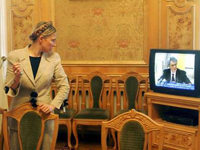Ukraine: Chronicle of Political Events on the Eve of Elections 2010
Ukraine is holding a presidential election, with candidates including President Viktor Yushchenko, Prime Minister Yulia Tymoshenko and former prime minister and opposition leader Viktor Yanukovich.

Following is a timeline of political events since the mass protests brought pro-Western politicians to power in 2004.
Jan. 23, 2005 - Viktor Yushchenko is sworn in as president after street protests in November and December against a rigged election won by then-Prime Minister Viktor Yanukovich.
Yulia Tymoshenko, Yushchenko's "Orange Revolution" ally, is named prime minister within days.
Sept. 8 - Yushchenko dismisses Tymoshenko's government after infighting. Yuri Yekhanurov, a presidential ally, replaces her.
March 26, 2006 - Yanukovich's Regions Party emerges as the largest party in a parliamentary election with 186 of 450 seats, but is outnumbered by the combined "orange" score of 243. Orange groups, however, fail to form a coalition after months of talks.
July 18, 2006 - A coalition made up of the president's opponents proposes Yanukovich as prime minister. He is approved a month later after promising not to reverse pro-Western policies.
Jan. 12, 2007 - Yanukovich supporters pass law to reduce Yushchenko's control of the government, a blow to his authority.
April 2 - Yushchenko dissolves parliament, calls election, leading to months of turmoil. New poll takes place in September.
Sept. 30 - "Orange" parties win a majority of 227 seats -- one more than needed to win most votes in the 450-seat chamber.
Dec. 18, 2007 - Parliament approves Tymoshenko as prime minister with 226 votes, the minimum number required to take office.
July 11, 2008 - Tymoshenko survives a no-confidence vote called in protest at her handling of high inflation.
Aug. 18 - President's office says Tymoshenko betrays national interests by not backing Georgia in its conflict with Russia.
Sept. 3 - Our Ukraine, Yushchenko's allies, quit "Orange" coalition after denouncing joint vote by Tymoshenko's bloc and Yanukovich's party. The president threatens to call an election.
Nov. 6 - The IMF approves a $16.4 billion loan programme for Ukraine to ease strains from the global financial crisis. Days later it receives its first tranche worth $4.5 billion.
Nov. 12 - Yushchenko abandons plans to hold an early parliamentary election in 2008.
Dec. 9, 2008 - The governing coalition is reinstated and bolstered by newly elected assembly chairman, Volodymyr Lytvyn.
Jan. 20, 2009 - Russian gas reaches Europe via Ukraine for the first time in two weeks after Moscow and Kiev end a prices and debt row that cut supplies to about 20 European countries. Yushchenko says the deal clinched by Tymoshenko is a "defeat".
March 3 - Parliament sacks Foreign Minister Volodymyr Ohryzko, a Yushchenko ally, citing his aggresive stance against Russia and for bungling a territorial dispute with Romania.
June 5 - Parliament dismisses another Yushchenko ally, Defence Minister Yuri Yekhanurov over allegations of corruption in the ministry.
Dec. 9 - Medvedev says it would be "irresponsible" to amend gas supply contracts with Ukraine, in a sign Moscow will offer no more concessions to its neighbour on gas payments. Yushchenko had asked Russia in November to change the gas supply deal, saying it was too onerous for Ukraine's economy.
* 2010:
Jan. 17, 2010 - Presidential election.
Reuters has contributed to the report.
Subscribe to Pravda.Ru Telegram channel, Facebook, RSS!


